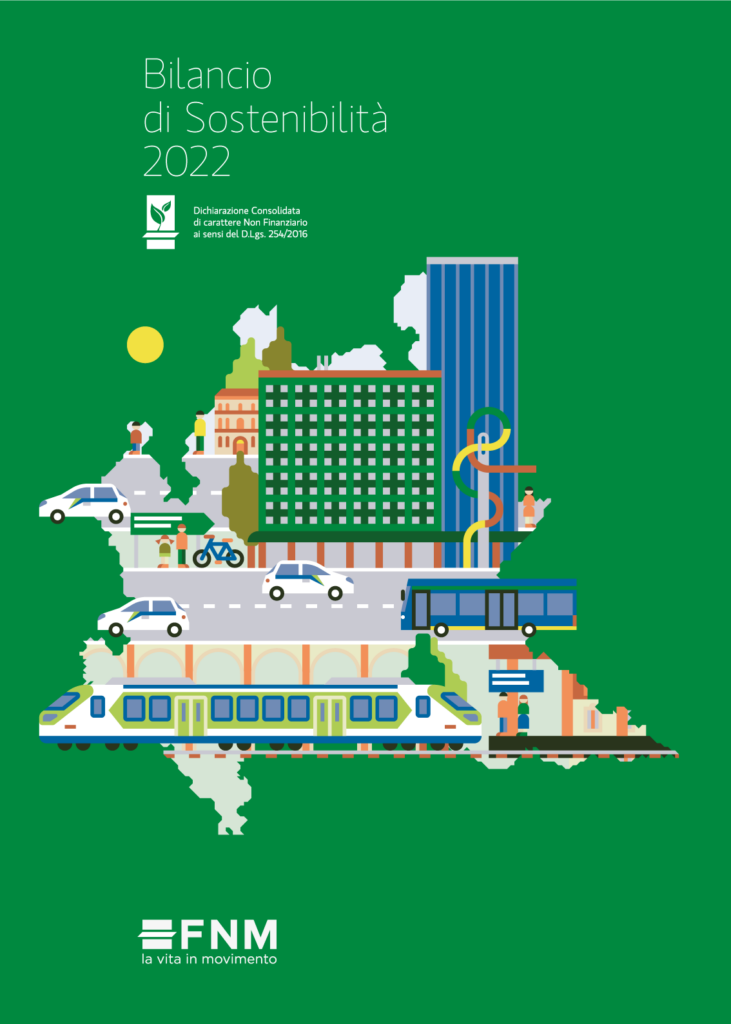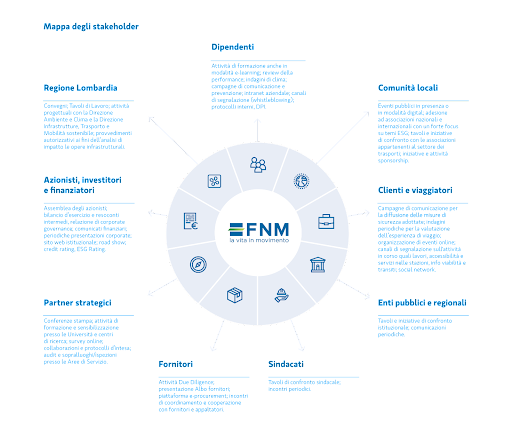Our sustainability model
The most ethical and sustainable businesses are able to reconcile economic objectives with the social and environmental goals of the local area. The FNM Group has embarked on a path of greater commitment to Corporate Social Responsibility issues, conscious of the opportunities that it can create for the company and all its Stakeholders. The creation of the new organisational structure, drafting of the Sustainability Report, development of training and awareness-raising activities for employees,, drafting of the Guidelines for Sustainable Purchasing, energy efficiency initiatives, management of internal working groups for environmental performance reporting, and coordination of work groups at national (ASSTRA – Transport Association) and international level (UITP) are just some of the activities developed in this area.

The creation of the new organisational structure, drafting of the Sustainability Report – Consolidated Non-Financial Statement drafted in compliance with the GRI Sustainability Reporting Standards, inspired by the International IR Framework and in line with the new EU Directive 2022/2464 Corporate Sustainability Reporting Directive (CSRD), development of training and awareness-raising activities for employees, drafting of the Guidelines for Sustainable Purchasing, energy efficiency initiatives, management of internal working groups for environmental performance reporting and coordination of work groups at national (ASSTRA – Transport Association) and international (UITP) level are just some of the activities developed in this area.
Sustainability Governance
The FNM Group has developed its own Sustainability Governance system in line with the new Corporate Governance Code to ensure compliance with the regulations in force as follows:
Committee for Social and Ethical Responsibility
Internal Board Committee tasked with promoting an ethical and environmental corporate policy in line with the Group’s sustainability strategy and by monitoring stakeholders’ economic, environmental and social expectations. Its tasks also include overseeing the drafting of the Sustainability Report-NFS.” Tra i suoi compiti figura anche la supervisione della redazione del Bilancio di Sostenibilità-NFS.
Committee for Control, Risk and Related Party Transactions
An internal Board Committee with advisory and proposal-making functions, which has the task of supporting the assessments and decisions of the Board of Directors relating to the internal control and risk management system with regard to CSR and sustainability, as well as those relating to the approval of periodic financial reports. .
Report Steering Committee
An internal committee overseen by the CSR/Sustainability department and comprising members of the Committee for Social and Ethical Responsibility and a representative from each of the main corporate areas of FNM S.p.A. and one representative from each of the companies included in the scope of the Sustainability Report-NFS, it participates in the process of stakeholder engagement and definition of CSR-Sustainability risks and is involved in the Sustainability Report-NFS project with regard to annual data collection.
CSR-Sustainability Department
Supervises and coordinates the FNM Group’s CSR and sustainability policies. It carries out management, planning and scheduling activities with the participation of all organisational units, while also promoting the adoption of sustainability principles. The department operates in various domains:
Sustainability reporting
The department is responsible for drafting the Sustainability Report (Consolidated Non-Financial Statement) compliant with the requirements of Legislative Decree 254/2016 and in line with the GRI Standards and the requirements of the major rating agencies and inspired by the guiding principles of the International Framework (IIRC). It prepared the 2020 Sustainability Plan, which includes specific sustainability goals, and contributed to updating them in the 2025 Strategic Plan. It also drafted the Guidelines for Sustainable Purchasing, which promote environmental and social sustainability criteria in the procurement process of Group Companies. It coordinates intergroup working groups for standardisation of data collection.
Sustainable Mobility, Energy Efficiency and the Environment
The department plays a leading role in environmental, energy efficiency and sustainable mobility issues. It promotes internal training courses on CSR-Sustainability, sustainable mobility and the environment. It has drawn up a handbook on good company practices. It coordinates internal working groups on environmental performance reporting and promotes initiatives to reduce single-use plastic consumption.
Corporate social responsibility
The department promotes and participates in activities on the topics of research and innovation in the field of sustainable mobility and energy efficiency, including through the establishment and coordination of relations with Universities, Research and Development Centres and Foundations, promoting the dissemination and education of a culture of transport and mobility.
ETHICS AND TRANSPARENCY
FNM has adopted its own Code of Ethics and Conduct. The document contributes, together with the Organisation, Management and Control Model pursuant to Legislative Decree 231/2001, to reinforcing the principles, values and controls of the FNM Group
In line with the Group’s principles and values, the document promotes and encourages whistleblowing, i.e. the practice of workers’ reporting of irregularities, fraud or breaches of regulations.
FNM has also adopted an Anti-Corruption Policy that identifies the principles and guidelines to prohibit and prevent engagement in any corrupt conduct in accordance with the principle of ‘zero tolerance’ of corruption, ensuring compliance with Anti-Corruption Laws and the culture of integrity.
GROUP POLICIES
To date, the Group has formalised the following policies:
- Diversity Policy
- Guidelines for sustainable purchasing
- Operating procedure
- Drafting of the Sustainability Report-NFS
- Health and Safety Policy
- Anti-corruption policy
- Remuneration Policy
- Taxation Operating procedure
- Environmental sustainability policy
The Sustainability Roadmap policy project led to the approval by the Board of Directors in 2023 of the FNM Group’s first Sustainability Policy.
SUSTAINABILITY POLICY
The FNM Group Sustainability Policy aims to represent the set of commitments made by FNM on environmental, social and governance issues. This policy is aimed at all stakeholders, presenting the values and principles that inspire FNM’s sustainable and responsible development. It represents a central element of the
Group’s integrated sustainability strategy, as an expression of the commitments that guide the relevant sustainability initiatives on which FNM periodically reports. The Sustainability Policy, in accordance with the objectives of the Strategic Plan, promotes
the consistency of the Group’s programmes, projects, activities and processes with ESG criteria. These criteria are mainly translated into commitments to reduce its environmental impact and manage the risks associated with climate change, and to promote the development of people while respecting the principles of inclusiveness and diversity.
Our stakeholders
The FNM Group is committed to continuous and constructive dialogue with its stakeholders.
Many listening initiatives involve more than one category of stakeholder, confirming the central role that the Group plays as a catalyst in fostering listening and the sharing of ideas, experiences and points of view, and in circulating best practices, with the aim of improving the services offered to communities and quality of life in the areas in which it operates.
MAIN GOALS OF STAKEHOLDER ENGAGEMENT:
Gathering stakeholder feedback and opinions on emerging issues
Gathering recommendations for identifying emerging business-related sustainability trends for updating strategic sustainability goals
Updating the materiality matrix
Alignment of the contents of the Consolidated Non-Financial Statement with stakeholder expectations

Lombardy Region
Conventions; Working Groups; project activities with the Environment and Climate Department and the Infrastructure, Transport and Sustainable Mobility Department; authorisations for infrastructure work impact analyses.
Customers and passengers
Communication campaigns to disseminate the safety measures adopted; periodic surveys to assess the travel experience; organisation of online events; channels for reporting on ongoing activities such as works, accessibility and station services, traffic and transit info; social networks.
Strategic partners
Press conferences; training and awareness-raising activities at universities and research centres; online surveys; collaborations and memoranda of understanding; audits and inspections/investigations at Service Areas.
Local communities
Public events on-site or in digital mode; membership of national and international associations with a strong focus on ESG topics; round-table work groups and initiatives for discussion with associations belonging to the transport sector; sponsorship initiatives and activities.
Shareholders, investors and lenders
Shareholders’ meeting; annual and interim financial statements, corporate governance report; financial press releases; periodic corporate presentations; institutional website; road shows; credit rating; ESG Rating
Suppliers
Due Diligence activities; Supplier Register presentation; e-procurement platform; meetings for coordination and cooperation with suppliers and contractors.
Institutional roundtable discussions and initiatives; regular communications.
Employees
Training activities, including e-learning; performance reviews; climate surveys;
communication and prevention campaigns; corporate intranet; reporting channels (whistleblowing); internal protocols, PPE.
Consequently, the Group invests in them through training, recognition of benefits and the creation of tools to promote work-family balance.